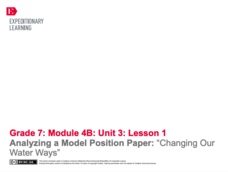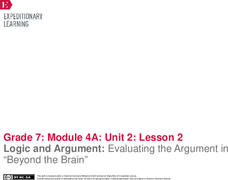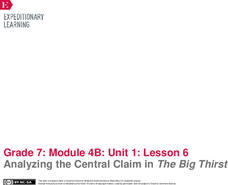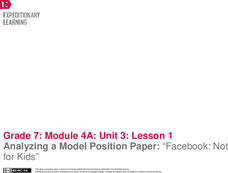NASA
Seasonal Science: Building Claims from Evidence
A lot can change in a year! Investigators observe a video of Earth over the course of a year and complete a KWL chart. Astronomers view a second video, participate in a guided discussion, and discuss the rubric for successfully...
NASA
Introduction: Building Claims from Evidence
Making a claim without supporting it has little value. Learners work on their claim-making skills in a well-designed instructional activity. They view still images from a video and make claims using support from the visual...
Nemours KidsHealth
Concussions: Grades 6-8
Teach middle schoolers to learn how to prevent concussions, recognize the symptoms of a concussion, and what they should do in case of a concussion. After reading articles that provide background information, groups create factsheets...
Nemours KidsHealth
Obesity: Grades 6-8
Screen time and fast foods, sugary drinks and greasy fries have lead to one-third of tween and teens being overweight or obese. As part of the Health Problems Series scholars analyze the nutritional value of the school food services menu...
Nemours KidsHealth
Diabetes: Grades 6-8
After reading a series of articles that provide background information about Type 1 and Type 2 diabetes, class members design a meal plan and an activity plan for a weeklong summer camp for 5- to 8-year olds with diabetes. A second...
Nemours KidsHealth
Eating Disorders: Grades 6-8
Raise awareness of eating disorders with a two-activity lesson with middle schoolers reading articles to gather background information and then create audio messages and advertisements that promote healthy self-esteem and body image.
Nemours KidsHealth
Cold and Flu: Grades 6-8
Wouldn't it be lovely if people were immune from colds and flu? Alas, such is not the case; however, there are things we can do to avoid getting or spreading these pesky health hazards. Middle schoolers read articles that provide them...
Nemours KidsHealth
Asthma: Grades 6-8
Two activities teach middle schoolers about asthma and how it can affect people's lives. After reading a series of articles and watching two videos that provide background information about asthma, pupils design an interactive game that...
Nemours KidsHealth
Online Safety: Grades 6-8
Recognize risky behaviors and avoid them! That's the big idea behind two activities designed to teach middle schoolers to think critically about online safety. After reading background articles about protecting online identity,...
Nemours KidsHealth
Bike Safety: Grades 6-8
Two activities teach tweens and teens about bike safety. After reading articles about bike safety, class members design tags with important safety reminders that can be attached to bikes. Groups then create a dance video that...
Humane Education Advocates Reaching Teachers
Justice for All - Educating Youth for Social Responsibility: Grades 6-8
Teach middle schoolers how to develop healthy relationships with activities and lessons designed to create a kind and inclusive
classroom. Pupils create guidelines to develop a safe and civil learning environment. They learn how to...
EngageNY
Analyzing a Model Position Paper: “Changing Our Water Ways”
Follow the leader for better writing! Scholars analyze a model position paper, "Changing Our Water Ways." During the first pass, they listen as the teacher reads the paper aloud. They then do a second read of the paper and complete a...
Nemours KidsHealth
Media Literacy and Health: Grades 6-8
Internet suffers could drown in the volume of information available on line. Here's an activity that can be a lifeline and buoy confidence in middle schoolers' ability to find reliable information and credible sources. After reading...
EngageNY
Mid-Unit Assessment, Part 1: Tracing and Evaluating Arguments
It's test time! As part one of the mid-unit assessment, scholars complete a Tracing an Argument note-catcher for both a text and a video about the Internet's effect on the brain. Pupils demonstrate learning by evaluating the argument and...
EngageNY
Evaluating an Argument: “Is Google Making Us Stupid?”
Does the Internet negatively affect peoples' brains? Scholars complete a Tracing an Argument note catcher to evaluate the question as they read the text "Is Google Making Us Stupid?" Exploring both sides of the issue, they add their...
EngageNY
Logic and Argument: Evaluating the Argument in “Beyond the Brain”
The brain is not the mind. Scholars explore the claim by reading an informational article about neuroscience research, "Beyond the Brain." As they read, they answer text-dependent questions and complete an anchor chart to evaluate...
EngageNY
End of Unit Assessment: Tracing and Evaluating Arguments
Give water the attention it deserves. Scholars watch Corporations Need to Pay More Attention to Water and respond to questions as part of their end of the unit assessment. They then complete the assessment by reading and responding to...
EngageNY
Tracing and Evaluating Arguments: “The Future of Water” and The Big Thirst
Can scholars predict the future? They try as they first watch the video The Future of Water to capture details and trace the argument. Next, individuals complete the Tracing an Argument
note catcher to guide their thoughts. To finish,...
EngageNY
Evaluating an Argument in The Big Thirst
Don't argue with me! Scholars first evaluate the argument in The Big Thirst. Learners work with partners to determine if the text supplies enough evidence to support the claim. They then complete a Tracing an Argument Note catcher for...
EngageNY
Analyzing the Central Claim in The Big Thirst
Quench the class's thirst for knowledge while building analytical skills. Scholars listen as the teacher reads excerpt from the book The Big Thirst. They then complete a close read and answer text-dependent questions from pages one...
EngageNY
Analyzing a Model Position Paper: “Facebook: Not for Kids”
It's time to take a position! Scholars learn to write a position paper by analyzing a model paper titled Facebook: Not for Kids. After studying the model paper, learners think about their own papers using the Position Paper Planner. They...
EngageNY
Writing an Argumentative Essay: Analyzing the Model Essay
Models and exemplars help pupils learn. Scholars read a model argumentative essay to prepare for an upcoming writing assignment. As they read, they work with partners to complete a worksheet analyzing the essay's structure.
Echoes & Reflections
Contemporary Antisemitism
Despite the recognized atrocities of the Holocaust, anti-semitism continues. The 11th and final installment of the Teaching the Holocaust series explores the long-term effects of the Holocaust on modern anti-semitism, asking pupils to...
Echoes & Reflections
Perpetrators, Collaborators, and Bystanders
After the Holocaust, the world grappled with how to bring justice to the Nazis. But what to do with the thousands—if not millions—who allowed it to happen? Young historians consider the issues of guilt, collaboration, and responsibility...

























